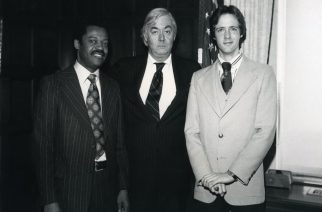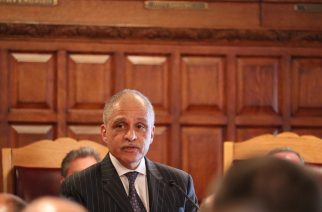
SUNY New Paltz President Donald Christian, left, speaks with financial journalist Rob Cox, right, who is the James H. Ottaway Seminar professor this semester, teaching a course titled “Financial Journalism and the Business of Media.”
On Feb. 6, SUNY New Paltz President Donald Christian held a Q&A session with financial journalist Rob Cox, the 2017 James H. Ottaway Seminar professor.
Students and faculty were invited to the Honors Center at the college to learn about Cox’s unique journalism experiences and how they inform the class he is teaching on campus this semester.
Every spring, the SUNY New Paltz journalism department proudly offers its Ottaway Seminar professorship to an exceptional journalist who is well-known and respected in their field. Previous professors in the program include New York Times investigative reporter and columnist Sydney Schanberg, Bernard Stein of The Riverdale Press, and John Darnton, a former Times foreign correspondent.
“This outstanding program would not exist without Jim Ottaway Jr. and his wife Mary who created this endowment in honor of Jim’s father,” Christian said.
Cox titled this year’s Ottaway Seminar “Financial Journalism and the Business of Media.”
The course engages students in assessing the capital and revenue of various companies, and teaches students to apply these analytical skills in their journalistic careers. In the 16-year history of the Ottaway Seminar, Cox’s adaptation of the course — which focuses heavily on business and finance journalism — is the first of its kind.
“Having a knowledge of finance broadens the world of media,” Cox said. “There are endless benefits that come from the ability to read a budget and to have a financial understanding of the companies you may want to work for.”
In 2000, Cox co-founded the news website breakingviews.com in London which afforded him many years of reporting abroad. Later, Cox sold the company to Thomson Reuters in 2009. Long before this, however, Cox had his introduction to journalism when he began delivering the Danbury Times on a bicycle as a kid
“The Danbury Times was a newspaper that Jim Ottaway wrote for,” Christian said. “Ironically, Rob told me ahead of time that throughout his life he had connections with Ottaway publications.”
In his first formal journalism class at Newtown High School in Connecticut, Cox admittedly said he “was not in the frame of mind for journalism” at the time and did not excel initially. However, during his time at the University of Vermont, Cox found himself focusing less on his studies and more on putting in long hours at the college’s weekly newspaper.
“I realized quickly I needed to rectify that inclination towards journalism,” Cox said. “‘This is something I am interested in doing,’ I realized.”
After college, Cox lived in Japan at the height of the Japanese stock market bubble, a time marked by speculative stock market mania where real estate values soared, eventually leading to a severe financial crisis after its burst.
While experiencing the environment of a foreign country during a period of economic turmoil and intense trade tensions with the United States, Cox quickly took an interest in finance and markets.
When Cox returned to the U.S. he had a choice to make — attend law school or enroll in a journalism graduate program.
“I ended up going to the Columbia Journalism School,” Cox said. “I wanted to sustain my interest in going abroad and getting involved with international business, so I looked for a publication that could offer me that.”
Cox began his professional career working as a financial journalist at the American Banker, an award-winning banking and financial news outlet. Cox described the publication as a “place where they would take young people and move them up the ladder.”’
In describing his inclination towards business and finance, Cox credited most of his interest in the hard factual nature of numbers. What a company puts out on paper in regards to their assets can be tested and tried for accuracy, Cox explained. In comparison, Cox said words from the mouths of politicians hold less intellectual weight for him.
This fiscally focused course Cox is teaching this semester takes a specific look at the economic regulation of gun control, an issue of great concern for Cox. As a father of two who grew up and raised his own family in Newtown, Connecticut, Cox found himself as the founder of the Sandy Hook Promise after the devastated shooting at Sandy Hook Elementary on Dec. 14, 2012.
The mission of the Sandy Hook Promise is to prevent gun-related deaths due to crime, suicide and accidental discharges through education, developing mental health and wellness programs and pushing for “sensible” gun-control policy.
“On that day, after making sure my family was safe, I set to work as a journalist,” Cox said. “The day after the shooting, a group of us in the community got together and said ‘what are we going to do about this; what message do we want to send?’’
The Sandy Hook Promise provides a centrist, non-partisan voice for changes on gun safety and gun control policies. The organization works to raise awareness of the signs a person may show when inclined to commit violent acts and how to quell them.
Under a national administration whose cabinet consists of many influential and wealthy businessmen, Cox said that now more than ever is the time to gain the skill of discerning a company’s commerce and value.
“Now more than ever community action is so important, this is a great opportunity for students and faculty to get a chance to have a discussion and ask questions,” said Mary Ottaway, who was in the audience for Cox’s introduction to the campus. “These types of events are the light in the dark of these turbulent times.”









